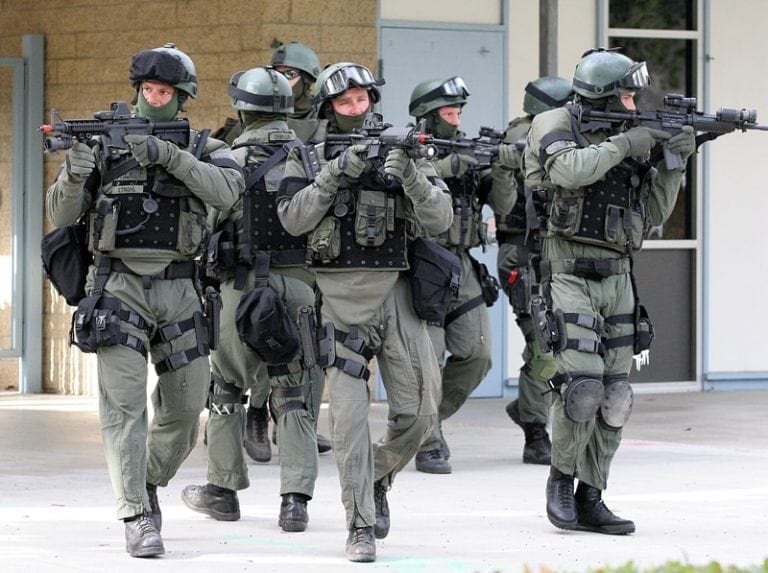
Army or police? It's becoming ever tougher to tell them apart. It's obvious the ruling elites fear urban wars.
Yes, there is a pandemic. And, yes, the COVID-19 numbers and deaths are rising in certain locales. In the Canadian province of Alberta, lockdown measures were put into effect that include shutting all casinos, gyms, dine-in restaurants, and bars. Mask wearing, despite what science says, has been mandated. As well, all outdoor and indoor social gatherings have been banned.
As CJ Hopkins wrote in a excellent essay on the transformation of societies since COVID-19,
Government officials are issuing edicts restricting the most basic aspects of our lives … where we can go, when we can go there, how long we are allowed to spend there, how many friends we are allowed to meet there, whether and when we can spend time with our families, what we are allowed to say to each other, who we can have sex with, where we have to stand, how we are allowed to eat and drink, etc. The list goes on and on.
The idiocy over the enforcement of COVID-19 lockdown provisions ventured into absurdity when the Calgary police pulled a taser on a young man for the crime of playing ice hockey outside. In an article at Medical Xpress titled “Catching coronavirus outside is rare but not impossible,” it was noted, “Almost all documented coronavirus transmissions have occurred indoors…”
Pandemic aside, police brutality and impunity for police excesses is a disturbing phenomenon that afflicts Canada as well as its southern neighbor, the United States. [1]
Does power corrupt, or is it power that attracts the already corrupted or corruptible?
An essay asked this question: “Are there ‘good’ cops? Of course there are, but the system is against them, and even they are inculcated in the culture of their work, taught the ‘facts of life’ and discouraged from ‘rocking the boat’.”
Imagine that you are a police officer, and you do your job enforcing the law without favor or prejudice. You have no racist bone in your body, and you sympathize with the plight of the poor. However, many of your colleagues are not serving the public good. In fact, they are breaking the law and are criminals themselves. You are aware that your colleagues are committing grave crimes, even murder. You oppose their racism and illegal actions, but you remain silent for whatever reasons. Maybe it is because you believe in the musketeerian one-for-all-and-all-for-one. Or maybe because you are told that it is a union matter, therefore, as a union member you are obligated to let the union handle the matter. Or maybe it is because you fear becoming a black sheep among your colleagues. Maybe you are afraid that you might lose a chance at promotion or, even worse, lose your job. Maybe you have a family and you are the sole breadwinner. Whatever the reason, you remain silent.
When you are a police officer, and when you are aware of racist attitudes among colleagues, and when you are aware of egregious criminality among your colleagues, and even though you are otherwise “clean,” can you be considered a good cop? Or do you become tainted by your silence? After all, is silence not a form of complicity?
Earlier this month, the BC Prosecution Service declined to pursue criminal charges against seven officers involved in the death of an unarmed man, Myles Gray. CBC reports,
Crown prosecutors say that because of contradictions between the statements of the officers involved and an inability to pinpoint the exact cause of death, they have not been able to establish a clear picture of what happened and therefore do not believe they can prove any of the officers committed manslaughter or assault.
Contradictions or a cover-up?
Yet police are bound by a code of ethics and held to accountability. On paper they are.
Compare it to another job. Let’s go straight for the jugular, if a restaurant worker brutally assaults a passerby outside the restaurant would the silence of several witnesses among the restaurant staff be tolerated? Were this criminality a regular occurrence in the restaurant world, and were silence the usual response among restaurant colleagues, would people in the mass media and general public respond that there are some good restaurant workers?
Why, then, does the deafening silence, the collusion among police for what seems to be ubiquitous criminality, so often get exculpated by noting there are some good cops?
Is there a good cop? What is a good cop? Can it be that a cop is good who turns a blind eye to evil and speaks not of the evil? Is not the silence of a cop in some salient manner a part of the commission of evil?
Nowadays, it seems more and more that members of society are afraid of their supposed protectors, the police. It is a contradiction that forces society to thoughtfully consider what security and protection means, and for who, and how best to achieve security and protection for all.
This communication may be unlawfully collected and stored by the NSA in secret. The information contained in this email is confidential and is only intended for the party to who it is addressed. If disclosure is sought, please ask permission. Thank you.
Covid-19 has put this site on ventilators.
DONATIONS HAVE DRIED UP...
PLEASE send what you can today!
JUST USE THE BUTTON BELOW

Puke if you must
This bloodsoaked monster is probably the most evil person on planet earth https://t.co/nGq2H1EPHt
— Ben Norton (@BenjaminNorton) April 9, 2020
[premium_newsticker id=”211406″]
![]() This work is licensed under a Creative Commons Attribution-NonCommercial 4.0 International License
This work is licensed under a Creative Commons Attribution-NonCommercial 4.0 International License
ALL CAPTIONS AND PULL QUOTES BY THE EDITORS NOT THE AUTHORS
Read it in your language • Lealo en su idioma • Lisez-le dans votre langue • Lies es in Deiner Sprache • Прочитайте это на вашем языке • 用你的语言阅读
[google-translator]







